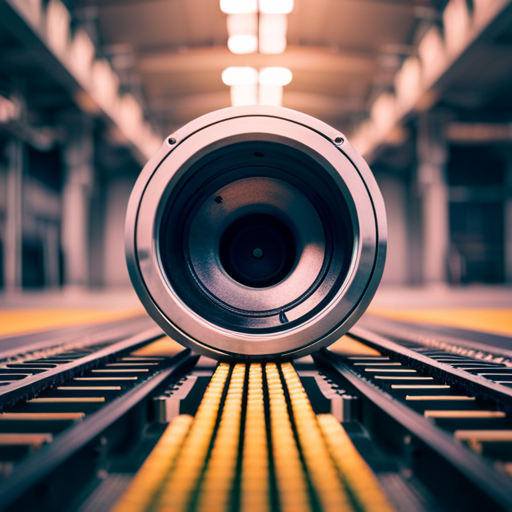
Did you know that custom solutions in 3D scanning have revolutionized the way complex projects are approached?
From intricate architectural designs to precision scanning of industrial components, tailored 3D scanning solutions have become a game-changer in various industries.
This article explores the advancements in 3D scanning technologies and the bespoke applications that address the unique challenges of complex projects.
Join us as we delve into the world of custom solutions in 3D scanning for complex projects.
Advanced 3D Scanning Technologies
Advanced 3D scanning technologies encompass a range of cutting-edge hardware and software solutions designed to capture highly detailed and accurate digital representations of complex objects and environments. These technologies utilize advanced scanning techniques to achieve high-resolution data capture, allowing for the precise measurement and modeling of intricate structures with unprecedented accuracy. From laser scanning and structured light scanning to photogrammetry and LiDAR, these techniques enable the collection of comprehensive data with exceptional clarity and precision.
High-resolution data capture is achieved through the utilization of sophisticated sensors and software algorithms that can process vast amounts of visual and spatial information. This results in detailed 3D models that accurately depict the intricacies of architectural elements, archaeological sites, industrial components, and more. The ability to capture such high-fidelity data is instrumental in various fields, including architecture, engineering, construction, and cultural heritage preservation.
These advanced 3D scanning technologies pave the way for tailored solutions for complex architecture by providing the foundational data necessary for in-depth analysis, design, and visualization. With the detailed digital representations obtained through advanced scanning techniques, professionals can create customized solutions that address the unique challenges posed by complex architectural projects.
Tailored Solutions for Complex Architecture
Tailored solutions for complex architecture involve unique architectural scanning techniques and customized 3D scanning solutions.
These solutions are specifically designed to address the challenges posed by intricate and unconventional architectural designs, ensuring accurate and comprehensive data capture.
Unique Architectural Scanning Techniques
Architectural scanning techniques for complex projects require a customized approach to accommodate the intricate design and unique features of the structures. Innovative scanning techniques are essential to capture the architectural complexity, while overcoming unique scanning challenges posed by building intricacies.
To address these issues, specialized methods such as multi-sensor data fusion and adaptive scanning strategies are employed. Moreover, the utilization of advanced software algorithms enables the seamless integration of data from various scanning technologies, ensuring comprehensive coverage and accuracy. Additionally, the deployment of custom rigs and mounting systems facilitates access to hard-to-reach areas, enhancing the overall scanning process.
These tailored solutions are vital for achieving precise and detailed scans of complex architectural elements, ultimately contributing to the successful completion of challenging projects.
Moving on to the subsequent section about ‘customized 3D scanning solutions’, let’s delve into the strategies and benefits of implementing such bespoke approaches.
Customized 3D Scanning Solutions
In implementing customized 3D scanning solutions for complex architectural projects, a meticulous approach is essential to ensure precision and comprehensive coverage.
Customized software plays a pivotal role in optimizing the scanning process, allowing for tailored data collection and analysis to meet the specific demands of intricate architectural designs.
Additionally, specialized hardware is instrumental in capturing fine details and intricate geometries, ensuring high-fidelity 3D models.
By integrating customized software and specialized hardware, 3D scanning solutions can effectively address the challenges posed by complex architectural projects, enabling accurate representation and documentation of intricate structures.
This tailored approach not only enhances efficiency but also facilitates the seamless integration of 3D scanning technology into the architectural workflow, ultimately contributing to the successful realization of complex architectural endeavors.
Customized 3D Scanning for Industrial Components
For industrial components, customized 3D scanning offers precise and tailored solutions for complex projects. This specialized form of industrial scanning allows for in-depth analysis of intricate components, providing valuable insights for various applications.
-
Advanced Measurement Capabilities: Customized 3D scanning enables highly accurate and detailed measurements of industrial components, ensuring precise specifications for manufacturing and quality control processes.
-
Complex Component Analysis: The technology allows for the comprehensive analysis of complex industrial components, including internal and external geometries, surface deviations, and dimensional accuracy.
-
Customized Inspection Solutions: Tailored 3D scanning solutions cater to the specific inspection requirements of industrial components, identifying defects, flaws, and inconsistencies with exceptional precision.
-
Streamlined Reverse Engineering: Customized scanning facilitates efficient reverse engineering processes for industrial components, enabling the creation of accurate digital models for design modifications and replication.
Customized 3D scanning for industrial components enhances productivity, quality, and innovation across diverse sectors, providing a competitive edge in the development and optimization of complex industrial projects.
Precision 3D Scanning for Artistic Projects
Precision 3D scanning technology offers unparalleled accuracy and detail for artistic projects, facilitating meticulous analysis and replication of intricate artistic forms. When it comes to precision art, 3D scanning techniques play a crucial role in capturing the intricate details of sculptures, artifacts, and other artistic creations. This technology enables artists, conservators, and historians to document and preserve cultural heritage with exceptional precision, ensuring that even the smallest details are faithfully reproduced.
Moreover, precision 3D scanning allows for the creation of digital archives, providing researchers and art enthusiasts with unprecedented access to high-fidelity representations of artworks. By employing advanced 3D scanning methods, art restoration and conservation efforts are enhanced, as experts can closely examine the finest features of a piece without risking damage. The application of precision 3D scanning in the artistic realm not only facilitates accurate replication but also aids in the exploration and understanding of various art forms, contributing to the preservation of cultural heritage for future generations.
As we delve into the innovations in complex project scanning, it becomes evident that advancements in 3D scanning technology have revolutionized the way intricate components and structures are analyzed and replicated.
Innovations in Complex Project Scanning
Advanced 3D scanning technology has ushered in a new era of precision and efficiency in analyzing and replicating intricate components and structures for complex projects. Innovative scanning approaches have emerged to meet the unique requirements of complex projects, providing tailored solutions for challenging scanning environments. These innovations include:
-
Multi-sensor integration: Combining different scanning technologies such as LiDAR, structured light, and photogrammetry to capture complex project requirements with higher accuracy and detail.
-
Adaptive scanning techniques: Utilizing real-time feedback and automated adjustments to adapt to the dynamic nature of complex project environments, ensuring comprehensive coverage and data completeness.
-
Customized software solutions: Developing specialized software to process and analyze large volumes of data from complex projects, enabling more efficient workflows and detailed insights.
-
Portable scanning solutions: Introducing compact and versatile scanning devices that can easily navigate through confined spaces and capture intricate details in complex project settings.
These innovative approaches address the specific challenges posed by complex projects, offering enhanced capabilities for comprehensive 3D scanning and analysis.
Specialized 3D Scanning for Unique Challenges
When faced with unique challenges, specialized 3D scanning solutions become essential.
Complex geometry scanning allows for the precise capture of intricate shapes and forms, while advanced data processing ensures the extraction of meaningful insights from the captured data.
Tailored project solutions further enhance the adaptability of 3D scanning technology to address the specific needs of each unique project.
Complex Geometry Scanning
For specialized 3D scanning of complex geometries, tailored solutions are essential to accurately capture and analyze intricate shapes and surfaces.
When dealing with complex geometry scanning, it is crucial to utilize advanced scanning technologies and precision measurement techniques to ensure the highest level of accuracy and detail.
To address the unique challenges posed by complex geometries, the following tailored solutions are commonly employed:
- Implementation of advanced point cloud processing algorithms
- Integration of high-resolution texture mapping for detailed surface analysis
- Utilization of multi-axis scanning systems for comprehensive coverage
- Application of adaptive scanning strategies to accommodate intricate features and shapes
Advanced Data Processing
To address unique challenges in specialized 3D scanning, employing advanced data processing techniques is essential for capturing and analyzing complex geometries with precision and accuracy. Advanced data analysis plays a crucial role in extracting valuable insights from the scanned data. Specialized software integration enables seamless processing of large datasets, allowing for efficient visualization and manipulation of complex geometries. Through advanced data processing, it becomes possible to identify and mitigate potential scanning errors, ensuring the accuracy of the final 3D model. The table below provides an overview of key advanced data processing techniques and their benefits in specialized 3D scanning.
| Advanced Data Processing Techniques | Benefits |
|---|---|
| Point cloud registration | Accurate alignment of multiple scans |
| Mesh refinement | Enhanced surface detail and resolution |
| Feature extraction | Precise identification of geometric elements |
Transitioning into tailored project solutions, the utilization of advanced data processing techniques forms the foundation for addressing the unique challenges presented by complex 3D scanning projects.
Tailored Project Solutions
Building on the foundation of advanced data processing techniques, tailored project solutions are imperative for addressing the unique challenges encountered in specialized 3D scanning for complex geometries. When dealing with intricate projects, tailored project management becomes essential to ensure the successful execution of 3D scanning processes.
Specialized scanning techniques are crucial for capturing detailed information from irregular surfaces or hard-to-reach areas. These techniques include structured light scanning, laser triangulation, photogrammetry, and computed tomography, each offering specific advantages for different types of complex geometries.
Bespoke Solutions for Intricate Designs
Aiming to address the unique challenges posed by intricate designs, custom solutions in 3D scanning offer tailored approaches for capturing complex geometries and detailed surfaces. When dealing with intricate designs, specialized equipment becomes essential to ensure accurate and comprehensive data capture. Custom solutions involve the use of specialized 3D scanning equipment designed to handle the intricacies of the specific project, enabling the capture of fine details and intricate features that may be challenging for standard scanning tools.
Moreover, bespoke solutions for intricate designs involve detailed analysis techniques to ensure that every aspect of the complex geometry is accurately captured. This may include employing advanced scanning technologies such as structured light or laser scanning to meticulously capture even the most intricate details of the design. Additionally, the data obtained from the specialized equipment undergoes detailed analysis processes to ensure that the captured information is comprehensive and reliable.
In essence, bespoke solutions for intricate designs in 3D scanning leverage specialized equipment and detailed analysis techniques to overcome the challenges posed by complex geometries and intricate surfaces, ultimately delivering precise and tailored scanning solutions for such projects.
Custom 3D Scanning Applications
Custom solutions in 3D scanning for complex projects pave the way for a diverse range of custom 3D scanning applications, which are tailored to address the specific needs and challenges of intricate designs and complex geometries. These custom 3D scanning applications utilize innovative scanning techniques to deliver precise and accurate results for a variety of purposes, including:
-
Reverse Engineering: Custom 3D scanning applications are employed for reverse engineering, allowing for the creation of digital models of existing physical objects. This is particularly useful for replicating or modifying complex components and structures.
-
Quality Control and Inspection: Innovative scanning techniques are used to conduct thorough quality control and inspection processes, ensuring that intricate designs meet exact specifications and standards.
-
Custom Prototyping: Custom 3D scanning applications play a crucial role in custom prototyping, enabling the efficient and accurate production of prototypes for complex projects.
-
Customized Product Development: These applications are instrumental in the customized product development process, facilitating the design and production of tailored products with intricate geometries and specifications.
Frequently Asked Questions
Can 3D Scanning Technology Be Used for Scanning and Reproducing Delicate and Intricate Artistic Sculptures and Artifacts?
3D scanning technology is instrumental in capturing delicate and intricate artistic sculptures and artifacts for artistic restoration and heritage preservation. It allows for precise reproduction, aiding in the conservation and documentation of valuable cultural objects.
How Are 3D Scanning Solutions Customized for Industrial Components With Complex Geometries and Materials?
Specialized techniques and precision technology are utilized to customize 3D scanning solutions for industrial components with complex geometries and materials. These solutions are tailored to address size limitations and ensure bespoke designs for architectural components.
What Specialized Techniques Are Used for Scanning and Capturing the Unique Challenges of Complex Architectural Designs?
Specialized techniques in 3D scanning for architectural preservation address unique challenges of complex designs. These techniques overcome 3D scanning challenges in capturing intricate details for historic restoration, ensuring accurate and comprehensive digital representations of architectural masterpieces.
Are There Any Limitations to the Size or Scale of Projects That Can Be Scanned Using Custom 3D Scanning Applications?
While custom 3D scanning applications have made significant advancements, limitations exist for scanning large scale projects and delicate artistic sculptures. Careful consideration of these limitations is essential for accurate and high-quality 3D scans.
How Does Precision 3D Scanning Technology Cater to the Specific Requirements of Bespoke and Intricate Designs in Various Industries?
Precision 3D scanning technology, through customized applications and advanced technology, caters to the specific requirements of bespoke and intricate designs in various industries. It ensures precision engineering and provides bespoke solutions to meet diverse project needs.
Conclusion
In conclusion, custom solutions in 3D scanning play a crucial role in addressing the unique challenges presented by complex projects.
With advanced technologies and tailored approaches, 3D scanning can accurately capture intricate details in architecture, industrial components, and artistic projects.
These specialized applications demonstrate the ‘necessity is the mother of invention’ as they address the specific demands of complex designs and projects, showcasing the innovative nature of customized 3D scanning solutions.

Lettie Kostohryz is a passionate writer and technology enthusiast, specializing in the realm of 3D scanning. With a keen interest in innovative solutions that bridge the physical and digital worlds, Lettie explores the intricacies of 3D scanning technology on her website, faxow.com. Through insightful articles and expert commentary, she demystifies the world of 3D scanners, unraveling their applications across industries and showcasing their transformative impact on design, manufacturing, and beyond. Lettie’s commitment to unraveling the complexities of 3D scanning makes her a valuable resource for those eager to explore the cutting edge of digital imaging.

Leave a Reply